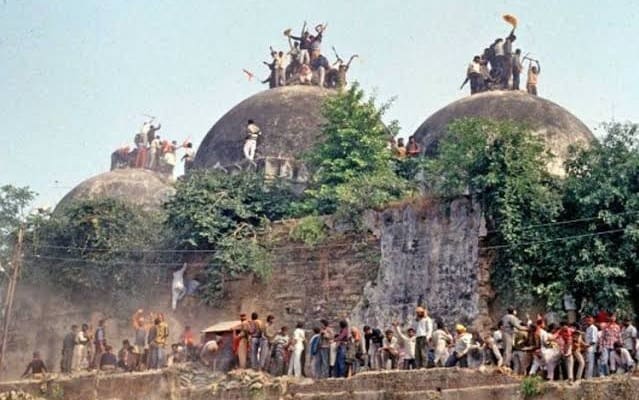An Indian court on Wednesday acquitted all 32 accused in the Babri Masjid case after a judge controversially ruled that the demolition was not preplanned.
A special court of India’s Central Bureau of Investigation (CBI) in Lucknow issued the verdict nearly thirty years after a mob of Hindu extremists razed the historic mosque to the ground.
As expected, the verdict attracted strong reactions not only from around the globe, but Indians too.
Sangh Parivar Leaders took out a Rath yatra, collected shovels & bricks, assembled thousand of people & shouted 'Ek Dhakka Aur do, Babri Masjid Tod do’
— Srivatsa (@srivatsayb) September 30, 2020
But apparently all this was not a pre-planned conspiracy!
It took 28 years for the courts to say #BabriMasjid fell on its own.
The mosque just fell down on it’s own https://t.co/e6pTy0hbLj
— Nidhi Razdan (@Nidhi) September 30, 2020
So "spontaneous" criminal acts are not punishable under Indian law?
— Happymon Jacob (@HappymonJacob) September 30, 2020
Asking for several friends.
So who demolished Babri Mosque?
— Saket Gokhale (@SaketGokhale) September 30, 2020
There’s pictures & videos. There’s accused admitting their role in interviews.
But doesn’t matter apparently.
The most painful chapter of modern Indian history closes with zero justice for the crime of brazenly demolishing a mosque.
Terrible.
Nothing is surprising anymore. No one was responsible. The structure came down on all on its own.
— Maya Mirchandani (@maya206) September 30, 2020
Yayyy. Justice, India style https://t.co/7Z5X7Gx5mF
— Rana Ayyub (@RanaAyyub) September 30, 2020
She ; I Demolished it
— Aarti (@aartic02) September 30, 2020
Court ; No One Demolished #BabriMasjid https://t.co/6Byw8Qi97E
About 10 years of instigation, nationwide Rath Yatra led to gathering of 1.5 lakh people with rope, iron rods, sickle and other weapons at #BabriMasjid. All these preparation couldn't prove conspiracy. But Delhi police says Delhi riots was conspiracy based on WhatsApp chats.
— Sanjukta Basu (@sanjukta) September 30, 2020
The only case in the world were the accused confesses to his crime, uses the confession to ride to power, cites video evidence to back up his claim and the judge says " Shut up, You stand acquitted"
— Rana Ayyub (@RanaAyyub) September 30, 2020
We should stop assuming that we live in a functional democracy. Outwardly, it might still appear to be one, but it really is not in many aspects. The assumption also gives a false sense of security to citizens who should know that their rights may not be their rights anymore.
— Pratik Sinha (@free_thinker) September 30, 2020
Meanwhile, Pakistan’s Foreign Office (FO) has also strongly reacted to the decision, calling it shameful.
BABRI MOSQUE:
Babri Masjid was a mosque in Ayodhya, India. Located in Ayodhya district, at a spot believed by Hindus to be the birthplace of Hindu deity Rama, it has been a bone of contention between the Hindu and Muslim communities since the 18th century.
The destruction of the mosque in 1992 sparked massive Hindu-Muslim violence that left around 2,000 people dead.
Hindu hardliners say the mosque was built after a temple dedicated to the Hindu god was destroyed by Muslim invaders. After the demolition of the mosque, Hindus and Muslims took the issue to a lower court, which, in 2010 ruled that the disputed land should be divided into three parts — two for Hindus and one for Muslims.
Late last year, the Indian Supreme Court (SC) had put to rest the decades-old Ram Janmabhoomi-Babri Masjid land dispute case, deciding in favour of Hindus.
The Indian top court had allotted Ayodhya land to Ram Janambhoomi Nyas (Ram Birthplace Trust).
Ram Janmabhoomi Nyas is an organisation to promote and oversee the construction of a temple in Ayodhya at the Ram Janmabhoomi, the reputed site of the birth of Rama, the seventh and one of the most popular avatars of Hindu God Vishnu.







